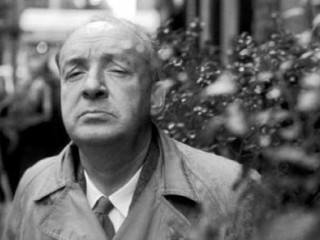
Vladimir Nabokov biography
Date of birth : 1899-04-23
Date of death : 1977-07-02
Birthplace : St. Petersburg, Russia
Nationality : Russian
Category : Famous Figures
Last modified : 2012-05-24
Credited as : novelist, Lolita, Professor Pnin
0 votes so far
After giving up his unremarkable poetry, he soon found his niche as a composer of Russian prose. His novels were serialized in émigré journals; successes came with The Luzhin Defense (1930), about a chess prodigy slowly losing his mind, and exile postcard The Gift (1938). Also of note is Invitation to a Beheading (1938), an experimental prose poem about a prisoner facing execution. Dashed off during a four-week fugue, the story is a quasi-Gnostic parable about the strife of the soul in a heartless world, reflecting a disgust with looming totalitarianism that brings to mind Koestler and Orwell. Nabokov later claimed that his characters did not have any power in his novels and were instead his "galley slaves", but Invitation's protagonist is somehow able to slip his chains. For all its strangeness, it is the most rewarding of his works in translation.
Nabokov's own European period was not without its tragedies. Soon after he finished at Cambridge, his father, an active émigré politician, was shot dead interrupting an assassination attempt. His brother Sergei was arrested by the Nazis; a homosexual, he died in a concentration camp. With the rise of the Third Reich, Nabokov once again fled, this time with his wife and young son in tow, to Paris briefly and then onward to the United States. There Nabokov taught literature, at Wellesley and later Cornell, and continued his parallel study of butterflies at Harvard. Throughout his life, Nabokov remained engrossed by the insects. He was a published scholar on the subject, classifying several new species, and making quiet contributions to a field distinct from his literary career. Much of his ethnographic research on American postwar culture was conducted on endless road trips and cross-country bug-hunting expeditions, and put to use in the travelogue portion of Lolita (1955).
Issued by French avant-porn publishing house Olympia Press -- other first editions include Naked Lunch and The Story of O -- Lolita brought Nabokov the condemnation of moralists and provided his ticket out of academia. While the professorial lifestyle sustained him and drove the creation of his masterpiece, he savaged the university in his prose, through the precious lecturer-poet in Pale Fire (1962), and the storybook about bumbling Professor Pnin (1957) -- the latter modeled viciously after a colleague at Ithaca. Both are pursued by a sociopathic narrator with murderous intent.
Selling the film rights for Stanley Kubrick's Lolita (1962) allowed Nabokov to retire to Switzerland, where he lived out the rest of his life in the penthouse of the Montreux Hotel. He died of pneumonia on July 2, 1977.
Lolita was first published in Paris by the obscure Olympia Press in 1955, then finally published in the U.S. by Putnam in 1958... Movie versions of Lolita were made in 1962 (with Sue Lyon as Lolita and James Mason as the aging Humbert Humbert) and in 1997 (with Dominique Swain as Lolita and Jeremy Irons as Humbert).
Author of books:
Mashenka (1925, novel, trans. Mary, 1970)
Korol', Dama, Valet (1928, novel, trans. King, Queen, Knave, 1968)
Zashchita Luzhina (1930, novel, trans. The Defense, 1964)
Soglyadatay (1930, novel, trans. The Eye, 1965)
Podvig (1932, novel, trans. Glory, 1971)
Kamera obscura (1933, novel, trans. Laughter in the Dark, 1938)
Otchayanie (1936, novel, trans. Despair, 1966)
Priglashenie na Kazn' (1938, novel, trans. Invitation to a Beheading, 1959)
Dar (1937-38, novel, originally serialized; collected 1952, trans. The Gift, 1963)
The Real Life of Sebastian Knight (1941, novel, first English novel)
Nikolai Gogol (1944, pseudo-biography of Gogol)
Bend Sinister (1947, novel)
Conclusive Evidence (1951, memoir, later reworked into Speak, Memory)
Lolita (1955, in France, 1958 in America)
Pnin (1957, novel)
Pale Fire (1962, novel)
Eugene Onegin (1964, translation and criticism of the Pushkin poem, 4 vols.)
Speak, Memory: An Autobiography Revisited (1967)
Ada or Ardor: A Family Chronicle (1969, novel)
Transparent Things (1972, novel)
Look at the Harlequins! (1974, novel)
Lectures on Literature (1980, lectures, ed. Fredson Bowers)
Lectures on Russian Literature (1981, lectures, ed. Fredson Bowers)
Lectures on Don Quixote (1983, lectures, ed. Fredson Bowers)
The Enchanter (1986, novella, proto-Lolita)
The Original of Laura (2009, unfinished novel, published as a gimmick)
















